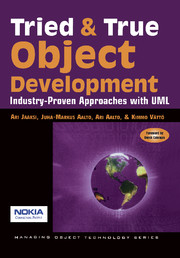Book contents
PREFACE
Published online by Cambridge University Press: 06 July 2010
Summary
What This Book Is About
This book is about software development. It presents approaches and practices for the construction of software systems based on features, objects, components, and architectural patterns. This book presents the key phases of software development, as well as the artifacts produced during these phases. Above all, this book communicates our practical experiences in developing large software systems.
The approaches presented here were developed at Nokia. We authors were involved in the development of the presented practices, which are currently used within Nokia and in other organizations of different sizes.
The approaches are blended from several commercial object-oriented methods and our own process improvement, and they use the Unified Modeling Language (UML) to visualize their phase products and blueprints. We have tuned the processes for our own needs for the development of large interactive software products. In addition, we have scaled the practices down to be applicable for projects of a few persons.
This book concentrates on the key elements of software development—the elements that we have found most important. First, we present our industry proven process model, its phases and deliverables. To be useful in real-life software projects, the process framework must be understandable and clear. We discus how to utilize the process model in different kinds of software projects. Second, we present our practices for the development of the user interface and the data management. These elements exist in the majority of software systems, and are often the most difficult parts; still, the majority of publications and process models seem to ignore them. We discuss what kind of practices, software tools, and architectural solutions support the development of these parts.
- Type
- Chapter
- Information
- Tried and True Object DevelopmentIndustry-Proven Approaches with UML, pp. xv - xviiiPublisher: Cambridge University PressPrint publication year: 1998



